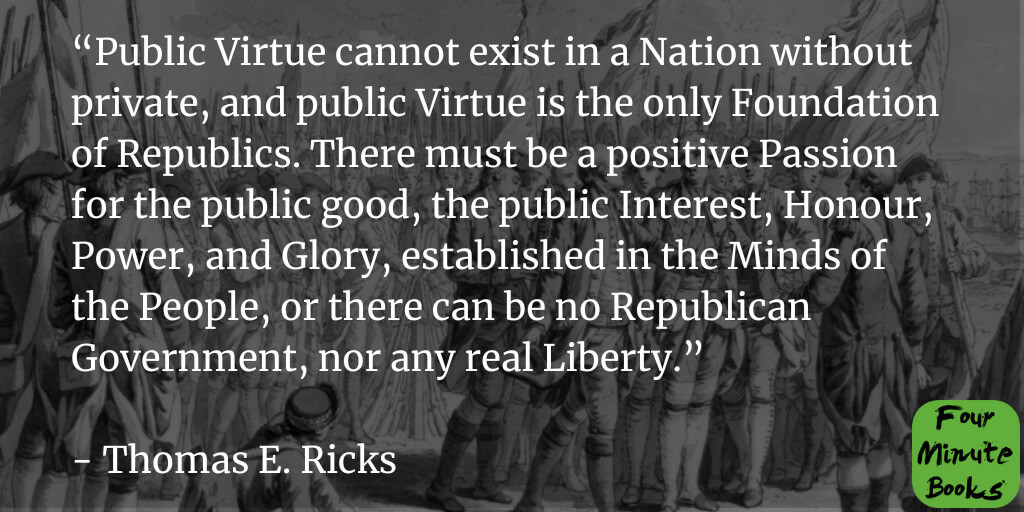1-Sentence-Summary: First Principles delves into the history of American evolution and highlights how the parents of modern thinking were inspired by Roman and Greek philosophy in their mindset, military actions, views of the world, and many more.
Read in: 3 minutes
Favorite quote from the author:

The influence of Greek and Roman political thought on America is a subject that historians debated for centuries. Some argue that it was minimal at best, while others claim it was pervasive throughout our nation’s early years.
Regardless of the extent to which these ideas influenced our founders, First Principles by Thomas E. Ricks prove that they had an undeniable impact on the formation of our republic.
It is no secret that ancient civilizations deeply influenced America’s founding fathers when creating their own country’s system of government. It was not only because they believed in strong republican values; these two cultures also provided a model for how such a system could work in practice.
To learn more about these systems, we’ll look at three of the most relevant lessons from this book:
- Washington’s education was deeply rooted in Roman ideologies.
- Greek philosophers also influenced American thinkers.
- Classicism and the idea of virtue slowly died as Americans sought freedom for all.
Now, let’s explore these lessons in depth and learn more about American culture and history.
Lesson 1: One of America’s leading figures was highly inspired by Roman emperors.
It is often the Greek philosophy and the Greek thinkers that occupy the first spots in any history debate or at an elite table. Greek ideologies shaped the world as we know it, paved the way for democracy, and shaped ideologies forever.
However, Roman philosophers and their culture also had plenty to do with how America grew to be today. Rome and its emperors shaped leading figures like Washington and many revolutionary Americans. They considered Cicero a great orator and an idol to learn from.
Revolutionary Americans considered that Rome had achieved the greatest level a state can hope for. Washington, a military genius, identified with Cato, a figure known for their virtue and for not giving in to the aristocracy, but rather fighting against corruption.
Washington strived to become such a figure and take America to the highest forms of a republic. To defeat the British, he imprisoned some of the great Roman generals, Fabius and Cincinnatus. He studied their strategies and tried to implement them, almost by impersonating them.
Lesson 2: The founding fathers of America found inspiration in Roman and Greek ways of thinking.
The founders believed that the democratic form of government found in ancient Greece and Rome was an ideal model for America, which had just broken free from Great Britain. They also wanted to ensure that the United States would be able to withstand any future threats from European powers.
In order for this to happen, America needed both a strong military and a well-educated citizenry who were capable of deciding matters of the state through reasoned deliberation rather than violence or coercion.
Jefferson, Washington, J. Adams and many others looked for inspiration in these ancient European states. Jefferson, in particular, was a fan of Epicurus, Euripides, and many other Greek philosophers that shaped his way of thinking.
In fact, Epicurus had a vision of life that Jefferson shared profoundly. We can notice that in the Declaration of Independence, he states that all humans are created equal and they have the right to pursue happiness. These concepts are central to the Epicurean philosophy.
Lesson 3: The leading figures of America saw radical changes from one mandate to the other.
The early nineteenth century marked a time of great change in American culture. The Enlightenment gave way to Romanticism, and classicism was replaced by a rather rational way of viewing things.
This shift in cultural focus was reflected in the principles that guided the people and their rulers. While Jefferson’s presidency and Madison’s afterward were marked by a return to classicism, it soon became an object of ridicule.
The masses were seeking more rational views of the world and free land. People also began to view slavery as a ridiculous concept compared to the American principle of freedom for all.
As reason and rationality gave way to emotion in the nineteenth century, classicism slowly died out of fashion. Virtue was no longer a guiding light for every endeavor, while free labor and a fairer world were the true aspirations now.
First Principles Review
In First Principles, Thomas Ricks explains how Greek and Roman philosophers altogether shaped America as we know it today.
In ancient philosophy, it was only through hard work and constant vigilance that man could be made virtuous enough to live freely and happily. This notion is closely linked with different waves of culture that America had experienced through its shaping process.
The book manages to examine how America’s Founding Fathers used classical philosophy in their own political theory. The essays address topics such as Jefferson’s views on slavery, Washington’s influence on economic policy, and Adams’ role in shaping foreign policy.
Who would I recommend the First Principles summary to?
The 30-year-old historian who enjoys a good read, the 50-year-old republican who wants to extend their knowledge in the field of American history, or the 45-year-old person who wants to find out more about the lives and views of the Founding Fathers of America.
Last Updated on October 6, 2022